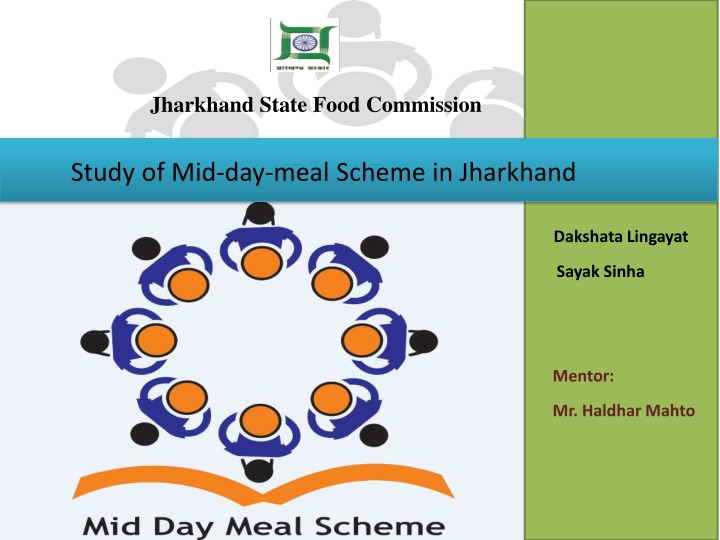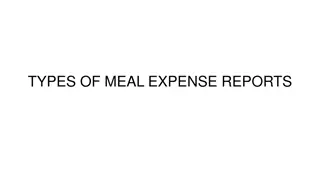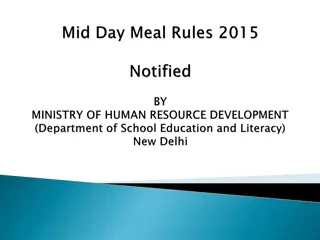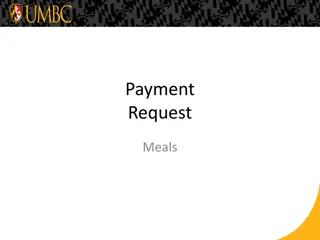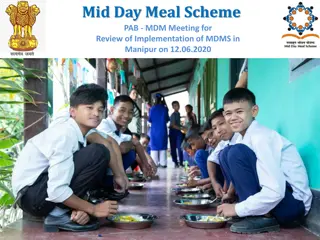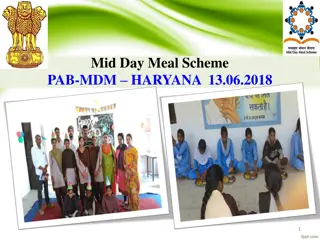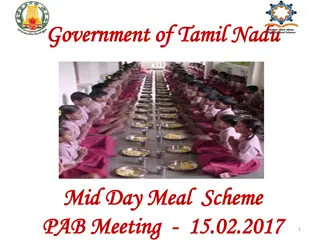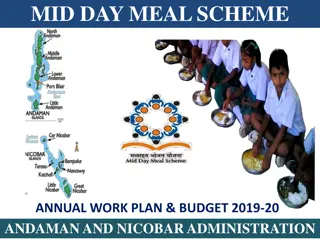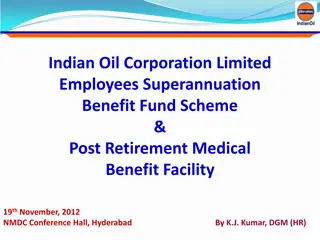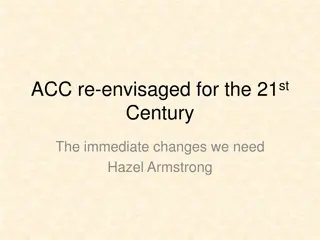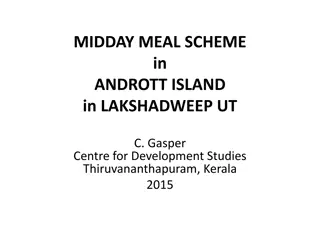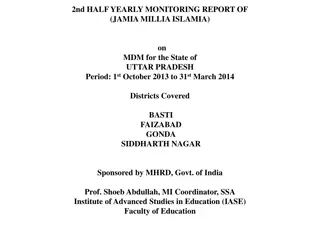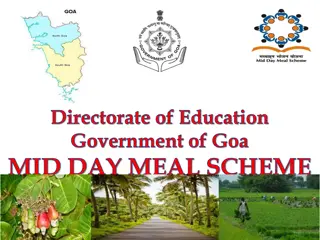Study of Mid-day Meal Scheme in Jharkhand
The study focuses on the implementation status, issues, and recommendations for the Mid-day Meal scheme in Jharkhand. It covers aspects such as delivery of entitlements, transparency, accountability, and grievance redressal mechanisms. Key findings include observations on food grains, funds, supplementary nutrition, infrastructure, monitoring, grievance redressal, and awareness. Recommendations highlight improvements needed in food grain estimation, stock management, disbursement, introduction of millets, and financial accountability.
Download Presentation

Please find below an Image/Link to download the presentation.
The content on the website is provided AS IS for your information and personal use only. It may not be sold, licensed, or shared on other websites without obtaining consent from the author.If you encounter any issues during the download, it is possible that the publisher has removed the file from their server.
You are allowed to download the files provided on this website for personal or commercial use, subject to the condition that they are used lawfully. All files are the property of their respective owners.
The content on the website is provided AS IS for your information and personal use only. It may not be sold, licensed, or shared on other websites without obtaining consent from the author.
E N D
Presentation Transcript
Jharkhand State Food Commission Study of Mid-day-meal Scheme in Jharkhand Dakshata Lingayat Sayak Sinha Mentor: Mr. Haldhar Mahto
Topic of our study Implementation status Scheme issues with the implementation. status of the delivery of entitlements. status of transparency and accountability measures. issues in grievance redressal mechanism. of Mid-Day-Meal
Introduction In Jharkhand MDM is served to 32,09,960 children 41,016 schools. It aims at increasing school attendance; provide nutrition to children and increase social cohesion. The National Food Security Act, 2013 entitles every child in the age group of 6 to 14 years; studying in classes I to VIII to hot cooked meal free of charge in all government and government-aided schools on all school days.
Methodology We began by analyzing the rules and notifications, guidelines and orders issued time to time by the Government of India and Government of Jharkhand. From these we learned about the provisions, entitlements, implementation, transparency mechanism and institutional structure for the MDM scheme. To identify issues in the implementation process we visited various stakeholders involved in the process; households of beneficiaries, DSE, DSO, BEEO, MDM Division of Department of School Education and Literacy, at the state level. We made field visits to Bishunpur block of Gumla district and Chhatarpur and Lesliganj blocks of Palamau district. and accountability
Observations and Findings Food grains Funds Supplementary Nutrition Infrastructure Monitoring Grievance redressal Awareness
Recommendations Food grains: Estimation of quantity of food grain based on the highest average monthly attendance in previous year. Stock of food grains at block level. Disbursement of food grains at Panchayat level through government employed dealer. Introduction of millets into the menu of MDMS
Funds: many schools purchase supplies for MDM from local shops on credit, such cases should be investigated immediately and their accounts should be settled A Green Channel Scheme similar to that of Andhra Pradesh should be adopted
Supplementary Nutrition: Funds for supplementary nutrition should be increased to Rs. 5 per egg from Rs. 4 per egg. Poultry farming by SHGs should be promoted so that perishable food items like eggs are locally available. Iron folic acid tablets should be distributed.
Infrastructure: Infrastructure of schools in the state should be reviewed through the monitoring capabilities of the CRPs Kitchen gardens should be introduced
Monitoring: An integrated monitoring mechanism should put in place. The state should conduct the technical review of the SMS monitoring System. Vigilance committees of local government bodies should be strengthened. State level Steering-cum-monitoring committees should meet every three months instead of every six months.
Grievance Redressal: A toll-free helpline number should be set up by JSMDMA, where people can lodge their complaints. Also, the Jharkhand State Food Commission should set up a toll-free number and maintain records of complaints lodged. A register of complaint should be maintained at BEEO office DGRO office, JSMDMA and Jharkhand State Food Commission. A Grievance Redressal Officer should be appointed at the block level. Also, an independent DGRO should be set up instead of notifying the Additional Collector for the same role.
Awareness: Awareness campaigns should be conducted in a phased manner Wall paintings should be put up that will state all provisions of MDMS. Also, pamphlets consisting the same should also be distributed. The Jharkhand State Food Commission should take steps to organize Nukkad Nataks and also use print and electronic media to spread awareness. The Jharkhand State Food Commission should write a letter to at least 1% beneficiary households, making them aware of the provisions of MDMS.
Incentives: Monetary awards for best performing school in every block, district and State should be introduced. The SMCs and Saraswati Vahinis should be given awards annually to incentivize and promote effective implementation of MDMS.
